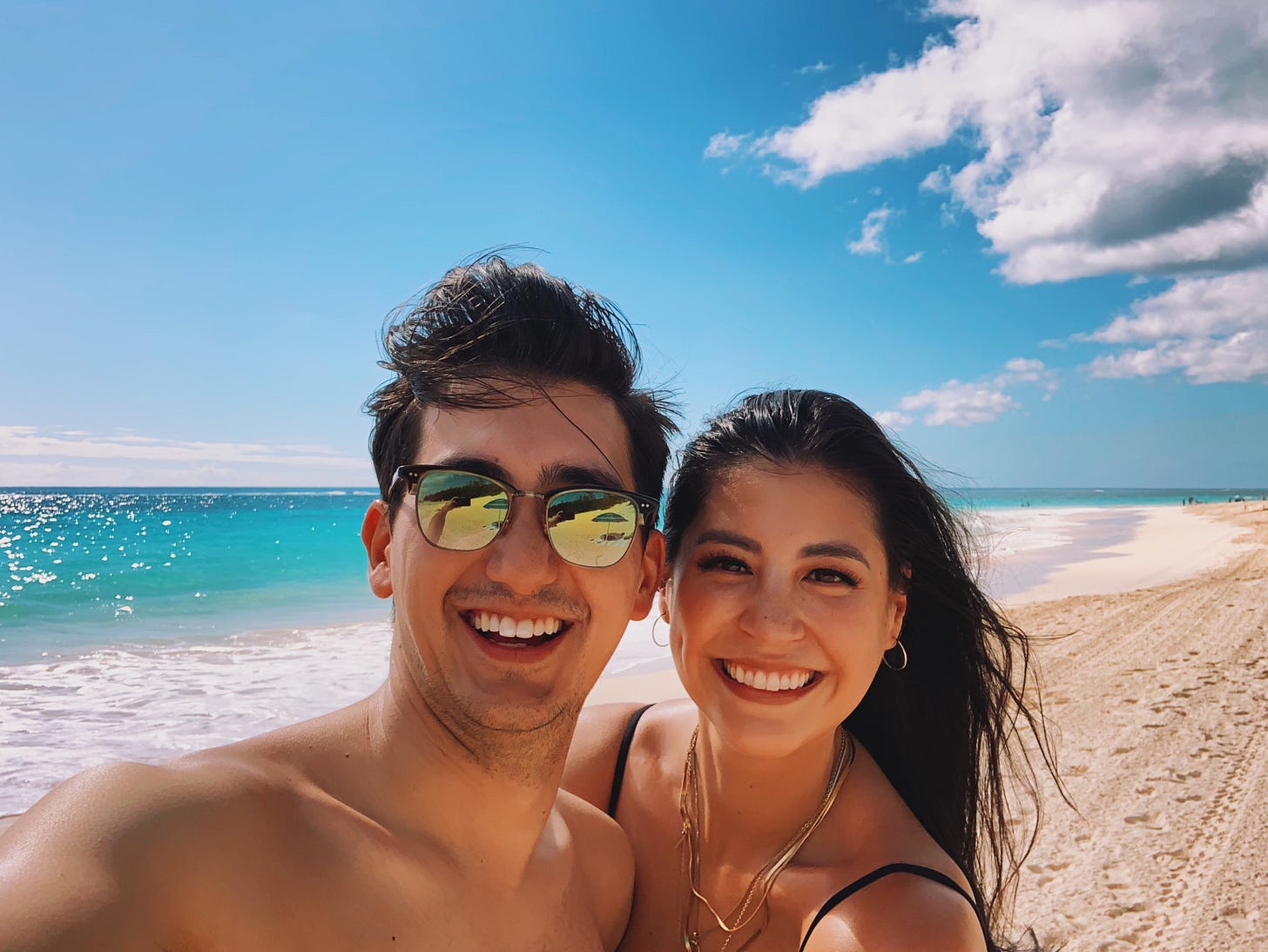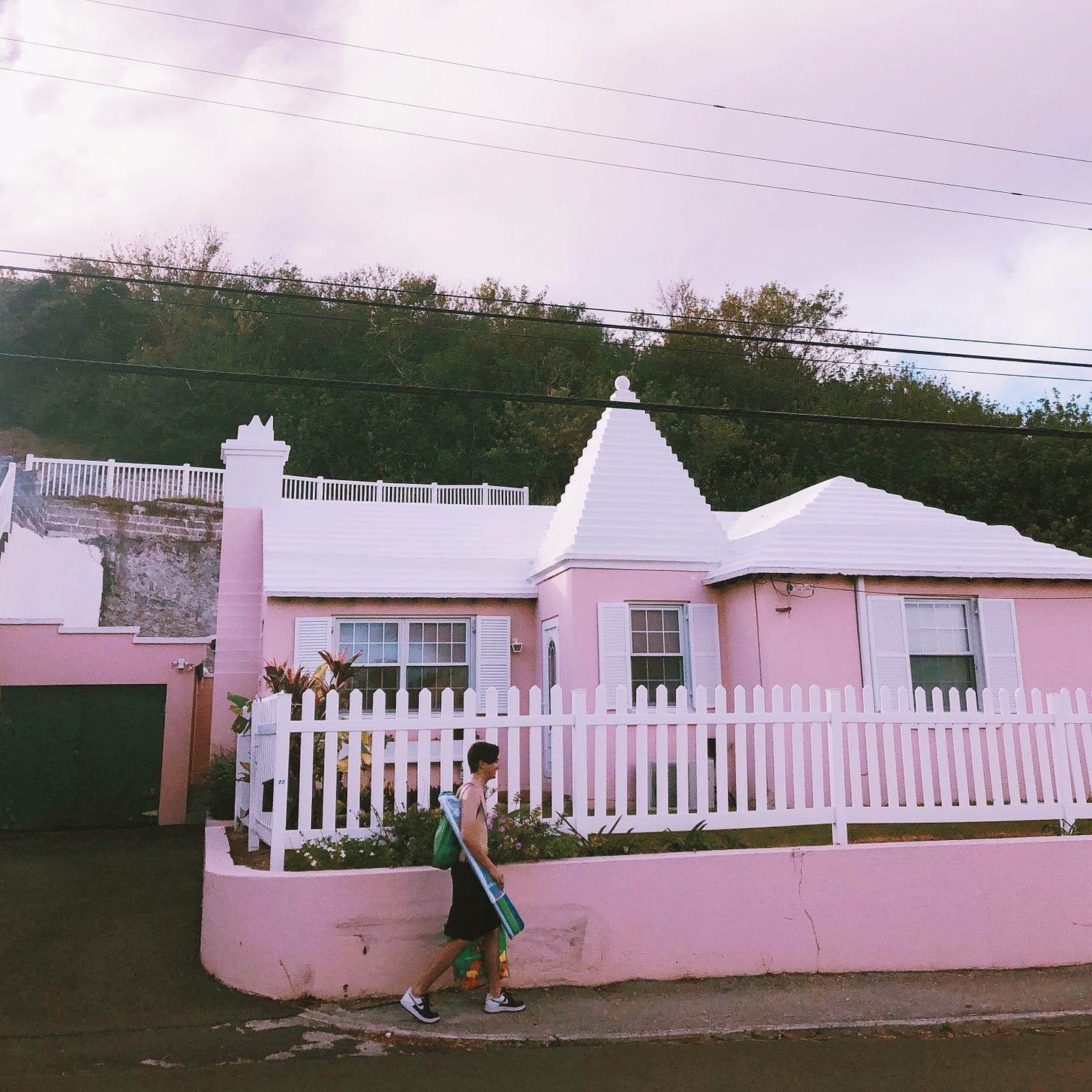Today marks three months since my husband died.
Today, and this week especially, I have been thinking about all the things that have been broken apart for my husband. All the will not and can not and never will be.
All of his unfinished.
Maybe the most obvious is that my husband did not finish his life as he thought he would, or as I thought he would.
Certainly, we both thought that we would be together on November 11th this year because November 11 is the day we got engaged in 2017, and the day in which we got married in 2018.
A reader wrote me a few days before the 11th and told me sometimes the lead-up to the day is worse than the day itself, and other times, the lead-up brings with it ‘normal’ amounts of anguish, and then the day itself fractures everything, all over again.
“Sometimes, it’s both; sometimes, it’s neither one,” she wrote.
I was so glad she sent me this email—grateful to have a guide, a sketch of some of the possible paths I might encounter as the 11th approached.
For me, the lead-up felt as ‘usual’ as it could with its pain, but the day itself was so much worse than I thought. It was so much emptier, so much more vacuous, so much more emblematic of all the things that are now in pieces.
My husband and I had planned to be in Victoria, British Columbia for our second wedding anniversary. We had decided, after we got married, that we would eschew anniversary gifts for experiences instead. Sometimes, these experiences were small (a staycation for one night in a hotel in the city where we lived) and sometimes these experiences were grand, like last year, when we flew to Bermuda for our first wedding anniversary.

We weren’t sure, last year, whether spending the money to go to Bermuda was wise. Together, we tussled back and forth on the pros and the cons, but in the end, we decided we were just going to do it. It was our first, we reasoned, we could go for the big beach experience.
Because November is the off-season in Bermuda, at times it felt like we were the only people on the island. This made the trip unusually peaceful and restorative, as if the entire place had been emptied just so we could hang out with each other, uninterrupted. It was also the last trip we would take together, because of the pandemic and because of his death.
We were in Bermuda for a week, and most days, we were the only people on what are some of the most beautiful beaches I have ever seen. We ate Lunchables and Goldfish crackers when we were hungry. His Lunchables were fancy, mini charcuterie collections and mine were the Lunchables marketed for children, the ones with cookies and marble cheese.
I read two, three books a day, and he read a few chapters too. Every so often, he would stop reading and get up to race along the length of the empty beach. He didn’t do this because he was bored or restless (I asked) but rather because he just felt like moving.
What a way to live.
Imagine being free enough to just leap up from your towel and streak along the beach, hollering, because you’re on that beach with your wife, and that experience feels to you like the ocean that’s right in front of you, an entirety stretched out, gleaming with known and unknown glories, just waiting for you to plunge into it.
I would watch him run and laugh, feel the glee of his blurring limbs deep in my body.
When the sun would slip away, and our sweatshirts and towels were no longer enough to keep us from feeling too cold, we would stand up, sandy and satisfied, and I would say it was time to think about dinner as he bundled all of our burdens together and carried them for us.

The morning of the 11th, I re-read his wedding vows. In one section, he had written:
"When I imagine fifty years into the future, reminiscing on the life we have lived, my only hope is for you to be in the rocking chair next to me. We might be so old that our eyes and ears can’t be in conversation, but our hearts always will.”
Oh, what a generous thing to write.
What a belief, what a hope, what a gift to be loved by someone like him. I looked through photos of the years we had together, almost seven, and for those years I am glad, but I could not stop myself from thinking that seven is not fifty.
The devil, I suppose, is in the fractions, the parts hoped to be a whole.
We had planned to be in Victoria this very week that has just passed, not just because of our wedding anniversary, but also because on December 1, 2020 my husband and I were supposed to move to Vancouver, which is accessible from Victoria. We were going to look at apartments in Vancouver for a few days, and then spend the rest of our time holidaying in Victoria.
We had all kinds of hopes: hopes of seeing friends we hadn’t for a long time, of seeing the sea, of finding a Holy Grail apartment: one with good light, two bedrooms, in-suite laundry, and dog friendly. The last condition was because earlier, in June of this year, we placed ourselves on a waiting list for a puppy (we even had a shared Google Note where I would continually add possible dog names and my husband would continually strike them down as too '“cutesy.”)
“What if we can’t find a good place to live?” I would fret.
“We will,” he would tell me, supremely confident. “We will.”
“How can you know for sure?” I would say.
“I just do,” he would say, and somehow his assurance, for which I couldn’t see any basis, would calm me.
We were moving because my husband was responsible for opening a new, Vancouver branch of the architecture firm he worked for. He was going to lead and build a team from the start. It was a big step for him, for us, and I had been watching him prepare for it over the last year.
I know sometimes it seems like all of the dead, particularly the young dead, are meant to be astronauts, but I am not rose-tinting things when I say that my husband was ready for the challenge the new city and role presented to him.
I saw his readiness myself, the way in which he tirelessly worked over the course of the last year, on his own, and in therapy, to build his confidence, refine his eloquence, and concretize his grounded-ness in the kind of leader he wanted to be, indeed, would have been.
It’s so quiet now, without him.
We talked about so much, major, minor, and all the in-between, that to have it fall silent, to have our continual, almost seven-year-long conversation suddenly cease—it’s jarring and sharp. The pieces of this silence cut me often. I still catch myself storing up everything I need to tell him, fill him in on.
One thing in particular weighs on me.
A few weeks before my husband died, he wrote a difficult exam. He had a passion for sustainable architectural practices, and this exam was the final step towards obtaining a Passive House certification (Passive House is one of the foremost licensing bodies on energy efficient building procedures and design, according to my husband).
When he died, he didn’t know the results of his exam. But, several weeks after his death, Passive House informed me, with their condolences, that my husband had passed.
We were at the edge of so much: new jobs, new city, new apartment, new dog, new ways of being (perhaps, even on the edge of parenthood, we mused).
We just didn’t know we were also at the edge of his life.
Now, my husband will not be a father, or a grandpa, or an uncle, or a husband of fifty-years, or old, or grey, or creaky, or go bald (as he worried he might, despite his thick, glorious hair). He will not travel back to Japan and show me more of the country he loved, or eat at Pujol with me in Mexico City, or take the oil-painting art class we planned to do together in the spring. He will not make friends and family laugh at his goofy, floppy dance moves. He will never again laugh so hard that it throws his head right back against his shoulder blades. He won’t order extra sashimi for us from our favourite local sushi bar, or play his latest music for me on his guitar, or the piano. He won’t show me how to bike along the Seawall in Vancouver, or see the ridiculous floral helmet I bought for the rides. He will not see any more seasons of television with me, will not be curled up with me beneath the throw blanket he tucked perfectly around my feet every night.
I could go on, but I won’t, because the list continues ad infinitum, and the point is clear: there was much we hoped for together, which is now broken up, impossible.
I deeply mourn my husband’s unfinished, because he is not here to do this himself.
Still, some things last. Some things remain.
I am glad, as I parse the wreckage, that among all the shattered and torn, our marriage is whole. My husband and I did not break up. We were not near that edge. We had teetered certainly, in times before, amid unhappiness, but in this year, this trying, difficult year, we had found our balance, together, right in step with each other.
My husband would be glad of this.
He always wanted to build things that would last. It was part of why he became an architect, part of why he loved being a husband, part of why he wanted to be a father, part of why he loved art, loved having it and collecting it.
I know this because we talked about it. We talked about all of it.
As always, you can contact me by hitting “reply” on the Sunday email or by leaving a comment. Thank you, so much, for reading.





Dear Amy, your words always leave me speechless. You speak of things too grand, too important, too painful and too whole for me to feel like I can utter anything. Thank you. This is what a reader - or anyone experiencing art - hopes to feel. Like there is a world that opened itself too us, a revelation, the crux of some existential imbroglio. So here’s me trying to give a little bit back to you with this short note of appreciation. What you are doing matters. Thank you for transforming your pain into something that illuminates others. P.S. I will buy your book.
Love you ❤️